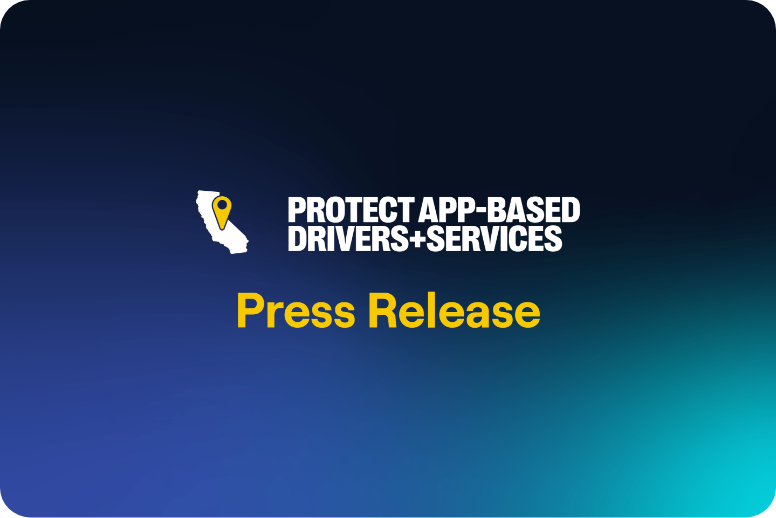Without Prop 22, rideshare and delivery services could also be eliminated altogether in many cities
SACRAMENTO — A new report from the independent Berkeley Research Group (BRG) found that an employment model for app-based rideshare and delivery services will have devastating consequences for consumers, greatly increasing costs and wait times, and eliminating services altogether in many cities across California. According to BRG, without Proposition 22, if an employment model were forced on app-based drivers:
- Rideshare costs would increase for consumers by at least 25.9% and as much as 100% in some markets—meaning that a typical $15 ride across town would cost between $19 and $30.
- Food and grocery delivery costs would increase by at least 35.2% and potentially double in some markets.
- An increase in wait times and a decrease in reliability for customers—meaning an average wait time for rideshare of 7 minutes may double to 14 minutes, and food/grocery delivery of 40 minutes may double to 1 hour and 20 minutes or more.
- A reduction of the customer base—meaning little or no service to most Californians living in rural or suburban areas of the state.
Rural and traditionally underserved communities will be hit the worst if Prop 22 does not pass. BRG’s report found that, under an employment model, app-based drivers will only be able to service the most densely populated areas, such as Los Angeles or San Francisco. As a result, the report concluded “the largest price increases will occur in areas of the state that are more sparsely populated and where consumer usage/demand is already lower”—predominantly rural and suburban communities.
“Many people don’t remember what it was like before app-based rideshare and delivery companies arrived on the scene. Cabs often refused to pick up in Black and Brown neighborhoods. It cost an arm and a leg to get anywhere, and food delivery was almost nonexistent,” said Dr. Tecoy Porter, Chairman of the CA State National Action Network. “We need Prop 22 to protect the availability and affordability of these vital services, especially for underserved communities of color.”
This, and previous research from BRG, confirmed what many drivers were already fearful of: an employment model would lead to a massive reduction in the number of drivers able to earn an income and a significant drop in wages.
BRG’s research concluded that, without Prop 22, if an employment model were forced on app-based drivers, 80-90% of app-based driver jobs would disappear, resulting in the loss of hundreds of thousands of jobs, and those that remain will earn significantly less as employees, dropping from today’s average of $19.55 an hour to $14.67 per hour. In contrast, a recent study from UC Riverside found that, under Prop 22, app-based drivers would earn at least $25 per hour. These effects, plus the added costs of employment, would result in increased consumer costs, increased wait times, and reductions in service areas.
“There’s a reason that, by 4-to-1, app-based drivers overwhelmingly want to be independent contractors,” said Devin Richey, a father who does app-based delivery to earn extra income. “We know forced employment means lost jobs and lost income, and higher prices and less reliable service for our customers. That’s why more than 100,000 drivers support Prop 22.”
About Proposition 22
More than 71 percent of app-based drivers want to remain independent contractors, despite efforts by politicians to force them to become or find work as employees. Additionally, a new study from UC Riverside School of Business Center for Economic Forecasting & Development found that Proposition 22 will lead to earnings well above minimum wage—averaging between $25 and $28 dollars per hour—for hundreds of thousands of California app-based rideshare drivers.
Proposition 22 would ensure driver flexibility, by protecting the ability of California’s one million app-based drivers to choose to work as independent contractors while providing new earning guarantees and benefits. These include:
- Prop 22 improves the quality of app-based work by requiring app-based platforms to provide drivers:
- Guaranteed minimum earnings (120% of California minimum wage) plus compensation toward expenses
- Funding for new health benefits for drivers who work just 15 hours a week
- Occupational accident insurance to cover injuries and illnesses on the job
- Protection against discrimination and sexual harassment
- Prop 22 implements strong new public safety protections:
- Recurring background checks of drivers
- Mandatory new safety courses for drivers
- Zero tolerance for alcohol and drug offenses
- Making it a crime to impersonate a driver
The Latest News

Opinion
I’m an Instacart driver: California Supreme Court must protect my job
By Stephanie Whitfield It may sound dramatic to say that app-based driving saved my life, [...] Read more
News
As Prop. 22 heads to California Supreme Court, support doesn’t break along ideological lines
By Bob Egelko Proposition 22, the 2020 ballot initiative sponsored by Uber and Lyft that [...] Read more